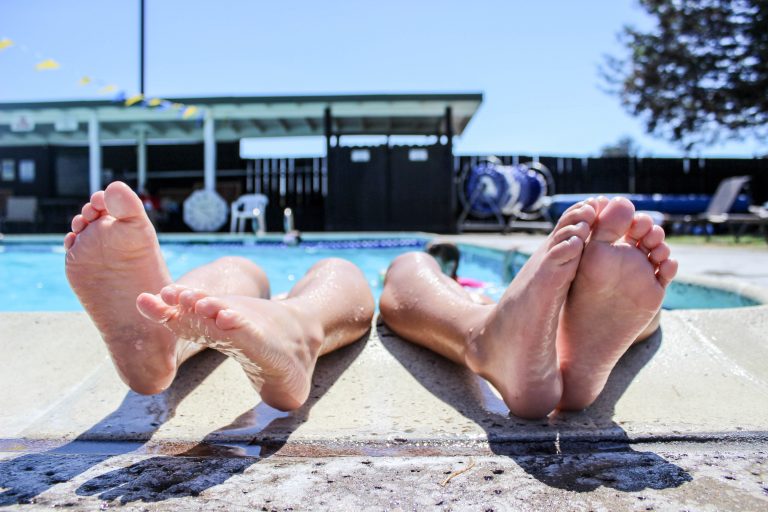
This blog is Part One of our two-part series offering tips on keeping a swimming pool clean. You can read Part One here!
As is probably clear by now, there are so many ways to help keep your swimming pool in top condition so you can enjoy it throughout the season. We’re going to dive right back into some of our best tips for pool cleaning and maintenance. (See what we did there?)
Best Ways for Keeping Your Pool Clean
Hire Professionals
While a few may deem this cheating, sometimes the best way to keep a pool clean means simply calling in professionals. They’ll know the science behind keeping a swimming pool clean and, for those who don’t have the time, hiring a pool maintenance service may actually be the best way to keep your pool clean. This is especially true when major problems develop, such as a major algae bloom. It’s also a good idea to take a sample of pool water to a professional service to conduct more accurate, comprehensive testing a few times yearly.
Keep Water Clear & Sanitized
Keeping a swimming pool clean and sanitized involves more than just throwing chlorine into the water. The following offers the best way to keep your pool clean and clear with swimming pool chemicals:
- Chlorine tablets, or an automatic chlorinator, help ensure even chlorine dispersion.
- Flocculant treats the cause of cloudy water, making the particulates clump so as to sink to the pool’s bottom, where they can be easily vacuumed up.
- For outdoor pools, stabilized chlorine with cyanuric acid – known as pool or chlorine stabilizer – prevents chlorine in the water from dissipating in the sun.
- Poly-hexamethylene biguanide (PHMB) can be used as a chlorine-free sanitizer to bind contaminants together into clumps, allowing the pool filter to easily collect them.
- Pool clarifier helps clear cloudy water quickly, though only treats the symptom.
Maintain Healthy pH Levels
Everything that goes into a pool’s water affects its pH, this includes rain, dirt, bugs, leaves, or even people. Measuring a pool’s pH entails determining whether the water’s acidic or alkaline on a scale from 0-14, with 7 being neutral. Below 7 and the water’s acidic, and above this level means it’s alkaline. Below 7, the water stings the eyes, though a neutral pH isn’t ideal either. Perfect pH for a swimming pool is slightly alkaline, between 7.2-7.8, though above this level can cause skin irritation. When pH measures 8 or higher it can even cause rashes. Tracking the pool water’s pH is a great way for keeping your pool clean and should be done on a weekly basis. To lower pH use muriatic acid or sodium bi-sulfate. To raise it, use sodium bicarbonate or sodium carbonate.
Shock Your Pool
Shocking a pool usually involves adding a high dose of chlorine all at once to oxidize contaminants, killing algae, bacteria, and even viruses. It should be done regularly whenever you smell that typical pool smell, which indicates that the chlorine in the pool has largely broken down into chloramines. These chloramines are what sting swimmer’s eyes and damage skin; the main point to shocking a pool is to control them. Keeping your pool clean from chloramines involves shocking the water with either bromine, calcium hypochlorite, or un-stabilized chlorine. As UV rays quickly dissipate pool shock, it’s best to shock pools at dusk or during the night.
Invest in a Skimmer
While built-in swimming pool skimmers automatically help with keeping your pool clean, sometimes this requires a bit of manual labor. Using a swimming pool leaf net to remove leaves, bugs and other floating detritus from the water’s surface will also help in keeping a swimming pool cleaner.
Test Water Regularly
Without knowing the composition of the water, keeping your swimming pool clean is just a guess. Testing the water should happen regularly. If chlorine’s less than 2 ppm it will require attention, and if it’s over 4 ppm it’s necessary to add some chlorine neutralizer to bring it down. Use the following to test pool water:
- Test strips are the quickest and easiest.
- Liquid test kits offer greater accuracy and more comprehensive readings.
- Digital water testing kits offer the most accurate readings.
As a general rule, it’s best to test pool water before and after adding chemicals, prior to a pool party, after it rains, or whenever in doubt.
Keep an Eye on Water Level
One basic way of keeping a swimming pool clean involves simply watching the water level. It needs to be kept at a certain point to allow the skimmers and filters to work. If the water level rises or drops, it can even throw off establishing how many chemicals need to be added.
Maintaining a Clean Pool After the Swimming Season is Done
The best way to keep your pool clean after the swimming season has ended is by winterizing it. To winterize your swimming pool:
- Clean it thoroughly and add chemicals recommended for wintertime to the water.
- Store chemicals, cleaning supplies, and implements for keeping your pool clean, like swimming pool leaf nets, in a dry area.
- If you live in an area prone to freezing, run the filter for an hour before disconnecting both the motor and pump, also storing it in a dry place.
- Lower water level below the swimming pool skimmers.
- Don’t drain the pool entirely as this can damage it.
- Add antifreeze specific for pools to the plumbing.
- Cover the pool with a winterized cover.
Halogen Supply has been a leader in the residential and commercial pool and spa industry for more than 80 years. To inquire about our pool products, please request a quote from us at Halogen Supply today!
